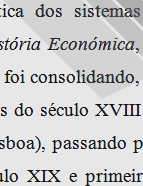

................................
Due to their relevance, the latter two works deserve special mention. Épocas de Portugal Económico (1st ed., 1929 and 2nd ed., 1947) has already been considered "our first, and perhaps still our only economic history" (Maria A. S. de Azevedo, Op. Cit., 1963). Indeed, for its depth and thoroughness of research and for its innovative perspectives (such as invoking the "materialistic context of history"), it stands out from the previously mentioned works, which are more general, pedagogical, and synthetic. At the beginning of the work, in the message addressed "To the Reader" (Lisbon, October 1928), the author clarifies: "The studies of which this volume is composed adhere to the materialistic context, not the only one, but one that is indispensable for understanding history. Nations do not live solely on heroism, their favourite subject. For each people, as for individuals, there is a balance sheet of Debits and Credits, which gives us the measure of their prosperity and where, early on, even for the greatest empires, the harbingers of decline are announced" (João Lúcio de Azevedo, Épocas de Portugal Económico, 2nd ed., 1947, p. 7). Lúcio de Azevedo adopted the theory of cycles—similar to that of the German historian Wilhelm Roscher (1817-1894)—developing a new periodisation of the economic history of Portugal, according to the predominance of a product in each era: "The Agrarian Monarchy," "The African Campaign," "India and the Pepper Cycle," "The Sugar Empire," "The Age of Gold and Diamonds," and "Under the Methuen Treaty." As highlighted in another study, "despite the limitations of the model—since other products could be invoked for their importance in Portuguese economic history, such as salt, olive oil, wood, cotton, wool, etc. (Jorge Borges de Macedo, "João Lúcio d'Azevedo e o seu tempo" [João Lúcio d'Azevedo and his time"] 1967, p. XXXV), its use was meritorious for presenting an alternative to the traditional and still not entirely abandoned periodisation, which was essentially political" (José Amado Mendes, "Desenvolvimento...," 1996, p. 204). Another limitation lies in the fact that the author did not focus on the period after the early nineteenth century. As for his collaboration in the História de Portugal (edited by Damião Peres), in the synthesis of volume II (João Lúcio de Azevedo, "Organização económica," 1931, pp. 395-444), he studies the evolution of the economy up to the conquest of Ceuta (1415), highlighting agrarian life and, more briefly, internal and external commerce and the circulation of wealth. In volume III (Id., Idem, pp. 625-664), he focuses on "Portugal as a Mercantile Power" and provides a brief review of the "Financial Situation" and the "Social State" (population, capital, Jews, professions, wages, cost of living, agriculture, industry, monopolies, and foreigners).
